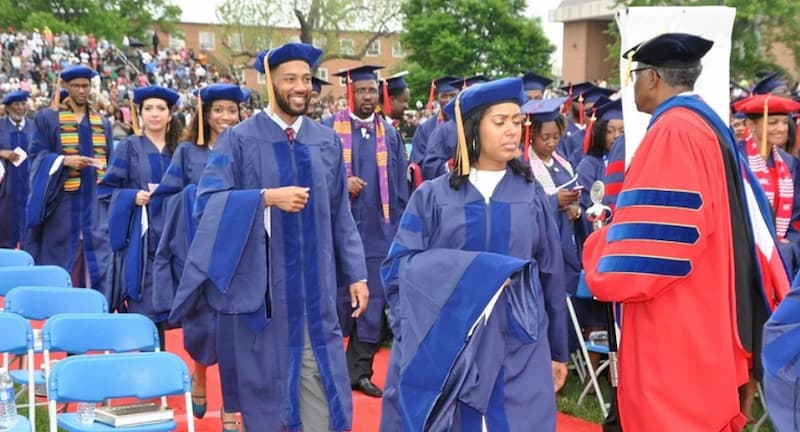With ASUU still on strike, Nigerians have spent $221m, about 92 billion Naira on foreign education in just three months.
This is according to a recent data by the Central Bank of Nigeria, CBN.
Meanwhile, data by the United Nations Educational Scientific and Cultural Organisation (UNESCO) says about 76,338 Nigerians were studying abroad as at 2018 alone.
According to the data from CBN, Nigerians spent at least $220.86 million on foreign education between December 2021 and February 2022.
ALSO READ: Nigerians Spend N199.5m On Mobile Subscriptions In One Month
Recall that the Academic Staff Union of Universities, ASUU, has been on strike for many weeks now.
This development has put on hold the academic activities of Nigerian students schooling in public universities in the country.
This is not the first time ASUU has been on strike in Nigeria.
While ASUU has been on strike for close to three months, polytechnic lecturers just commenced a two-week warning strike.
In fact, the academic body has always interrupted academic activities by going on strikes.
It shuts down universities to push for its demands from the federal government.
However, the federal government usually does not either respond on time or decides to throw crumbs at improving the education sector of the country.
Consequently, many Nigerians end up spending more years trying to study a course that ordinarily should not take such years.
For instance, with ASUU strikes, a course that should take four years to complete sometimes takes between 5 to eight years to complete.
This development, aside other interests of gaining foreign certificates, has pushed and keeps pushing more Nigerians to seek foreign education.
Also, the poor nature of the education system in Nigeria and the dilapidated facilities in Nigerian universities have equally contributed to this.
Meanwhile, the National President, Academic Staff Union of Polytechnics, Dr. Anderson Ezeibe, told the Punch that the failure of the government to invest adequately in the education sector had negatively impacted the education sector.
“You go to tertiary institutions and you see dilapidated buildings, lecturers and students alike are not happy, students do not have access to good equipment for practicals, at the end of the day, the system continues to churn out half-baked graduates.
Hence, more and more Nigerians are leaving the country under the trend, “Japa” to seek foreign education and economic stability.
Therefore, Nigerians are spending hugely to acquire foreign education.
corroborating this, Convener, Reform Education sector, Olubunmi Olusanmi, told the platform that the development is not healthy for the Nigerian education system.
“Education is the bedrock of any nation, you cannot neglect that sector and say you want to focus on infrastructure.
“Nigerians go to other countries to avoid some of the drama that goes on in our local schools.
“Talks of strikes have been annual festivals and we have all seen it as normal.”
Breakdown of the amount:
Meanwhile, the data by the CBN shows that between December 2021 and February 2022, Nigerians spent at least $220.86 million on foreign education.
It said the amount for educational service under the sectoral utilisation for transactions valid for foreign exchange for December 2021 to February 2022.
According to the data, in December 2021, Nigerians spent $90.67m on foreign education.
Meanwhile, in January 2022, Nigerian students seeking education abroad spent a total of $60,202,730.84 on foreign education.
Likewise, in February 2022, they spent $69.9m to acquire foreign education.
CBN has not yet released the data for the months of March, April and May 2022 as at the time of filing this report.
Similarly, the data from CBN showed that Nigerians remitted more than $220m to foreign academic institutions in three months.
It said despite this foreign remittance, there is no significant reciprocity in form of inflows from foreign sources to the Nigerian local education sector.
Implication of this trend:
The implication of this trend is that there is too much pressure on the naira exchange rate.
This too much pressure leads to Naira depreciation.
Consequently, the Naira is currently exchanging at over N600 to one American Dollar.
Also, it means that more Nigerians are demanding more dollars to pay for tuitions and other educational expenses.
Meanwhile, the Nigerian foreign reserves equally suffers as the demand for dollars to pay foreign educational institutions gets higher.
This high demand increases pressure on the Naira exchange rate and weakens the naira against the dollar.
On the solution to the trend, Dr. Ezeibe said thus:
“The only solution to this is for the government to invest fully in the sector.
“If we operate world-class schools in the country, there will be no need for people to go to other countries.
He said Nigerians will not go to foreign countries “to obtain good education,” if our education system is working.
Also, Olusanmi said said the solution lies in the government investing hugely to improve the education system of the country.
“We cannot continue to go on like this.
“The truth is that many individuals who have the resources will continue to go out.
He added saying they will go out “and get better quality education.”
“The government needs to do better.”



















 and then
and then